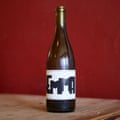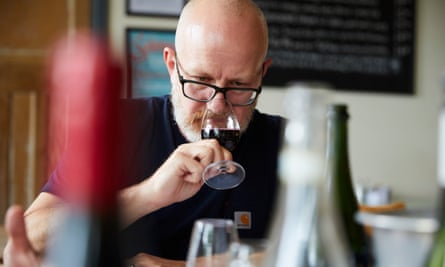Steve Nuttall is trying to mess with my head. The 35-year-old wine expert at boho Leeds bar-restaurant the Reliance has arranged a natural wine tasting as a primer for the Guardian, and things are getting, well, weird. “That,” I offer tentatively, sniffing an orange wine, “smells strange – somewhere between sherry and cat piss.”
Nuttall laughs. He is not offended. In fact, after years of talking in the polite language of traditional wine appreciation, Nuttall is relishing the culture around natural wine, which encourages drinkers to trust their palates and speak honestly. Cà de Noci’s Notte di Luna remains enigmatic: tannic like red wine, but surprisingly acidic with something citrusy in there, too. “It’s a bit pine-fresh toilet cleaner,” I add, getting into the spirit of things.
We riffle through several more natural wines – all made with almost zero mechanical or chemical intervention – and they are certainly intriguing. Every mouthful delivers little shocks and rewarding challenges. An entry-level white, Meinklang’s Sziklafehér, smells oddly ripe, but its apple and gooseberry flavours are unusually lively. A rugged Spanish red opened the evening before – Nuttall wants to illustrate how sensitive natural wines are to oxidation – has taken on a bizarre bready, popcorn savouriness. Farnea’s Emma, another orange wine (they are made with white grapes with the skins left on, to develop that vivid colour and flavour complexity) is like a conjuring trick, ostensibly full of sweet peach, rose water and tangerine flavours, but bracingly bone-dry and pleasantly medicinal.

The reason for this flavour carnival? Additives – or the lack of. Using added sulphur, lab techniques and about 70 legal additives, industrial wines are manufactured to be stable, consistent and, arguably, narrow in their flavours. In contrast, natural wine is additive-free, regularly unfiltered and utilises only a tiny amount – if any – of sulphur. These are sustainably produced, handmade, wild-fermented wines that wear their idiosyncrasies proudly and change subtly, bottle to bottle. It is high-wire winemaking and, as Nuttall concedes, some are “shit”. But, for many, that unpredictability is exciting. “Sulphur mutes everything; it makes wine orderly, neat, considered. With [natural], there are extreme highs and lows, but when you get one that really sings, it’s whoosh …” Nuttall trails off, making a soaring motion with his hand.
Natural wine has been fermenting in France since the 1970s, but recently such epiphanies have turned it into a phenomenon. The magazine Wine Business International (WBI) estimates that natural accounts for less than 2% of global sales, but, in hotspots such as New York, Copenhagen, London and Paris – where a small, fast-growing network of militant bars sell nothing but natural – it is very much a thing.
A thing that is breaking nationally in Britain, too. Leeds has two venues (the other is Ham & Friends) pushing natural wines, and the Reliance will soon open a bar-shop, Wayward. From Bristol’s Bar Buvette to Edinburgh’s Good Brothers via Brighton’s Plateau or Chester’s Covino, you can find natural wine in most British cities. Indeed, Oddbins has announced it will stock nine natural wines in selected stores.
In 2007, UK importer Les Caves de Pyrene handled, perhaps, 15 natural producers. Today, it distributes 220, and sales are growing fast. “You find them on the best restaurant lists and even odd examples in local pubs. Natural wine drinking has increased exponentially and there’s another 15 to 20 smaller importers who specialise in it,” says the firm’s Doug Wregg.

That rise is not solely down to flavour. Like craft beer, natural is both a drinks category and a movement: a revolutionary sect in the vanguard of a radical new wine culture. This is wine’s punk or acid house, a generational schism (in 2014, the hugely influential US critic Robert Parker called natural wine a “scam”), in which young drinkers are rejecting the stuffy wine establishment. “Natural very much gets away from that ‘serious’ blazer-and-jeans wine world,” says Nuttall, of a scene that – hence the disparaging tag “hipster wine” – takes in Williamsburg’s Four Horsemen bar (owned by LCD Soundsystem’s James Murphy) and rapper Action Bronson. The presenter of Vice’s F*ck, That’s Delicious, Bronson has launched his own wine, À La Natural. “There’s been a massive change in how wine is made, sold and enjoyed,” says Dan Keeling, co-editor of Noble Rot, a fanzine launched in 2013 as an irreverent wine equivalent of the Face, mixing grapes with art and music (it subsequently spawned a restaurant and wine import business). “There’s a new generation who can’t afford or don’t want to engage in classic regions such as Bordeaux, and natural wine has enjoyed a boom because of that.”
Natural wine is open and inclusive, with its breezy marketing (there is an Australian wine, a blend of seven grapes from three different vintages, simply called Bonkers) and its relatively modest pricing (most bottles retail at £10 to £60). That has dovetailed neatly with a new relaxed attitude in UK wine bars (Sager + Wilde in Bethnal Green, east London, arguably kickstarted this trend), that – by serving wines by the glass and at lower markups; focusing on small producers and unfashionable winemaking areas such as Corsica or Tenerife; introducing chatty, bolshie tasting notes – have engaged a new audience with wine. A tweet from York’s Cave du Cochon summed up the prevailing attitude. It advertised a new wine with: “What a grand cru chablis would taste like if it wasn’t so far up its own arse.”
Even the way Nuttall handles these wines is startling. He takes a bottle of murky, sparkling Orsi San Vito’s Sui Lieviti (knockabout, vivacious stuff, with a distinct wild-fermented-scrumpy edge) and, rather than gingerly pouring it so the unfiltered lees remain in the bottle, upends it to mix it all together. “Sometimes what you’re pouring looks crazy, sediment, bits of grape skin, but most producers prefer you get it all in,” he says. “They go: ‘This is the best bit.’” One Australian winemaker even admonished Nuttall for changing the glasses between wines at a tasting. “He went: ‘Steve, what the fuck are you doing, mate? Just pour it in!’”
This rebellious attitude is, very much, inspired by the natural-winemakers themselves, in France, Italy and, increasingly, in Australia, Spain and eastern Europe. They are – sometimes bitterly – opposed to “big wine”, which they regard as both an ecological disaster (vast vineyards bereft of biodiversity, poisoning waterways with pesticides etc) and a creative dead end.

Natural wine does not do red tape. Makers only use organic or biodynamically grown grapes, but, often without official certification, and most French winemakers work outside the appellation system (a rule-bound bureaucracy that dictates which wines can be labelled authentic to that area). Instead, they grow whatever (heritage, low-yield) grapes they like and make experimental wines that – fermented in clay amphorae pots or produced pét-nat, a low-tech sparkling-wine method – use ancient, rough ’n’ ready techniques.
Makers revel in the categorisation vin de table or vin de France, historically a label for cheap plonk, and tend to produce fresh, young wines to be drunk now. So-called “juice” that is fun and gluggable (glou-glou in French) is prized as highly as elegant, complex wine. “It’s a punky, DIY attitude: who are you to tell us what we should think about wine?” says Keeling.
It is easy to over-romanticise this world of hippy farmers, part-time idealists and big characters such as the Italian Gabrio Bini. “A very charismatic, stylish mad professor,” says Nuttall. Purple prose about wines imbued with “emotion” reads like gullible hype. Similarly, lacking hard scientific data, the case for biodynamic viniculture can smell – literally, as it involves burying horns of cow manure and growing by moon cycles – like bullshit.
Nonetheless, it is hard to be cynical about these tiny, driven winemakers. “It’s not about money, and making really good natural wine is hard,” says Keeling. Sam Jary, winemaker and owner of Penrith’s Black Hand Wine shop, argues that the efficacy of biodynamic growing is self-evident. “Winegrowers are busy, practical people working extremely closely with nature. Their livelihood depends on it. If biodynamics didn’t improve their grapes and wine, they wouldn’t touch it.”
Could such ideas become mainstream? Not immediately. It is difficult to expand production of natural wine quickly. Many makers choose not to. But there is scope for more producers to adopt natural methods, the big players, too. “It’s gaining momentum,” says WBI editor, Felicity Carter. “Producers who were extremely sceptical are beginning to experiment with lower sulphur and different fermentation vessels. It has opened up possibilities for mainstream producers, which they appear to be relishing. The day a big producer such as Treasury Wine Estates makes a natural wine will be the day it goes mainstream. I wouldn’t be surprised if that isn’t far off.”
For the record, Treasury, which owns such globe-straddling brands as Blossom Hill and Wolf Blass, has nothing imminent. But watch this space, says Reliance co-owner Joss Ainsworth. “This year, at one of Bordeaux’s premier cru vineyards, the sharp-suited gentleman showing us round said they’re talking about moving to organic [growing], ‘because that’s the trend’.”
Yet, a significant proportion of the wine establishment still loathes natural wine. They hate its implied moral superiority (are other wines therefore unnatural?). They complain that there is no strict definition of “natural”; instead, winemakers abide by a loose, informal code. They scorn what they regard as its flawed, fragile wines. The Spectator’s wine writer, Bruce Palling, called natural an “absurd clean cult”. Most great wines, he argued, are already made with minimal intervention.
While a trained master of wine may find irredeemable flaws in a wine, others take a more holistic view. “Those ‘faults’ can exist to different levels and, in some cases, I’d argue they add to the wine’s character. It isn’t black and white,” says Nuttall. “Advocates of conventional wine can’t handle that and, even more, can’t handle that some hipster kid on Lower Clapton Road – who they’d argue knows nothing – is celebrating the wine for it. It fundamentally undermines all their learning and hard work.”
This wine, he continues, “requires you to engage individually with it”. That may be natural wine’s most challenging quality. Not its flavours. But that it asks drinkers to think for themselves.

Comments (…)
Sign in or create your Guardian account to join the discussion